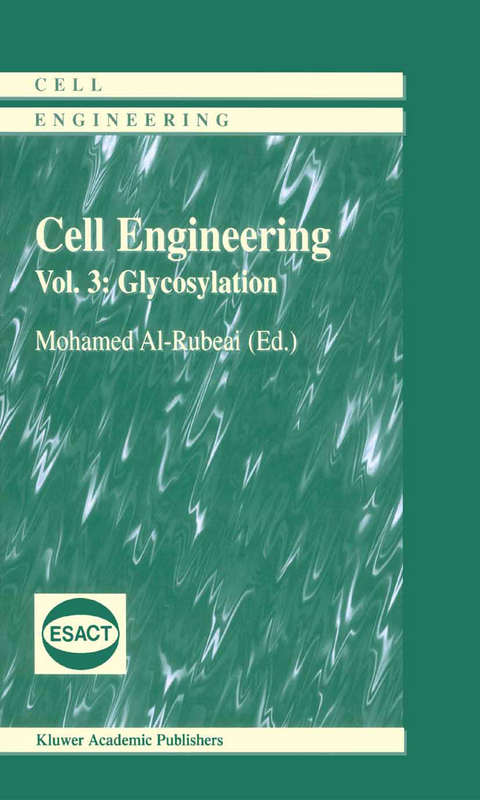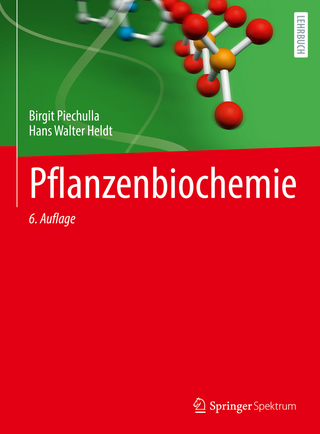
Glycosylation
Seiten
2002
Springer-Verlag New York Inc.
978-1-4020-0733-0 (ISBN)
Springer-Verlag New York Inc.
978-1-4020-0733-0 (ISBN)
The analysis and modification of glycans of recombinant proteins is an active area of research. This book is intended for research students and senior scientists in cell culture and glycobiology, as well as for industrial biotechnologists and biochemical engineers interested in the production of therapeutic glycoproteins.
The analysis and modification of glycans of recombinant proteins continues to be active and challenging area of research and for the successful manufacture of these proteins. In Cell Engineering, volume 3: Glycosylation, Dr. Mohammed Al-Rubeai has compiled a group of articles that will provide research workers not only with reviews of the advances that have been made in all facets of the subject but with an in-depth assessment of the state of the art methodology and the various approaches for the improvement of glycoprotein production. Particularly important in this respect is the advances made in the development of genetically engineered host cell lines with novel glycosylation properties, as well as the integration of mass spectrophotometric analysis with separation techniques.
This volume is intended not only for research students and senior scientists in cell culture and glycobiology, but also for industrial biotechnologists and biochemical engineers interested in the production of therapeutic glycoproteins, virus vector and ex vivo expansion of human cells for medical treatment.
The analysis and modification of glycans of recombinant proteins continues to be active and challenging area of research and for the successful manufacture of these proteins. In Cell Engineering, volume 3: Glycosylation, Dr. Mohammed Al-Rubeai has compiled a group of articles that will provide research workers not only with reviews of the advances that have been made in all facets of the subject but with an in-depth assessment of the state of the art methodology and the various approaches for the improvement of glycoprotein production. Particularly important in this respect is the advances made in the development of genetically engineered host cell lines with novel glycosylation properties, as well as the integration of mass spectrophotometric analysis with separation techniques.
This volume is intended not only for research students and senior scientists in cell culture and glycobiology, but also for industrial biotechnologists and biochemical engineers interested in the production of therapeutic glycoproteins, virus vector and ex vivo expansion of human cells for medical treatment.
Analysis of Glycans of Recombinant Glycoproteins.- The Effect of Cell Culture Parameters on Protein Glycosylation.- Glycosylation of Recombinant IgG Antibodies and Its Relevance for Therapeutic Applications.- Cellular Modification for the Improvement of the Glycosylation Pathway.- Controlling Carbohydrates on Reconbinant Glycoproteins.- Targeting of Genetically Engineered Glycosyltransferases to In Vivo Functional Golgi Subcompartments of Mammalian Cells.- A Metabolic Substrate-Based Approach to Engineering New Chemical Reactivity into Cellular Sialoglycoconjugates.- Addressing Insect Cell Glycosylation Deficiencies Though Metabolic Engineering.- Asparagine-Linked Glycosylational Modifications in Yeast.
| Reihe/Serie | Cell Engineering ; 3 |
|---|---|
| Zusatzinfo | VII, 235 p. |
| Verlagsort | New York, NY |
| Sprache | englisch |
| Maße | 155 x 235 mm |
| Themenwelt | Naturwissenschaften ► Biologie ► Biochemie |
| Naturwissenschaften ► Biologie ► Zellbiologie | |
| Naturwissenschaften ► Biologie ► Zoologie | |
| Technik ► Umwelttechnik / Biotechnologie | |
| ISBN-10 | 1-4020-0733-7 / 1402007337 |
| ISBN-13 | 978-1-4020-0733-0 / 9781402007330 |
| Zustand | Neuware |
| Haben Sie eine Frage zum Produkt? |
Mehr entdecken
aus dem Bereich
aus dem Bereich


